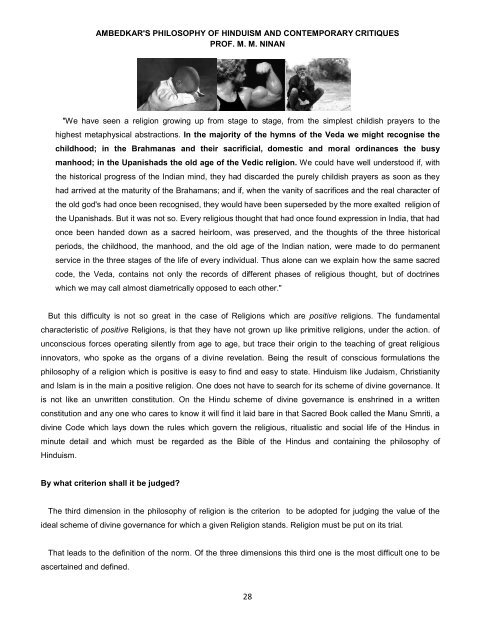Ambedkar-Philosophy of Hinduism
You also want an ePaper? Increase the reach of your titles
YUMPU automatically turns print PDFs into web optimized ePapers that Google loves.
AMBEDKAR'S PHILOSOPHY OF HINDUISM AND CONTEMPORARY CRITIQUES<br />
PROF. M. M. NINAN<br />
"We have seen a religion growing up from stage to stage, from the simplest childish prayers to the<br />
highest metaphysical abstractions. In the majority <strong>of</strong> the hymns <strong>of</strong> the Veda we might recognise the<br />
childhood; in the Brahmanas and their sacrificial, domestic and moral ordinances the busy<br />
manhood; in the Upanishads the old age <strong>of</strong> the Vedic religion. We could have well understood if, with<br />
the historical progress <strong>of</strong> the Indian mind, they had discarded the purely childish prayers as soon as they<br />
had arrived at the maturity <strong>of</strong> the Brahamans; and if, when the vanity <strong>of</strong> sacrifices and the real character <strong>of</strong><br />
the old god's had once been recognised, they would have been superseded by the more exalted religion <strong>of</strong><br />
the Upanishads. But it was not so. Every religious thought that had once found expression in India, that had<br />
once been handed down as a sacred heirloom, was preserved, and the thoughts <strong>of</strong> the three historical<br />
periods, the childhood, the manhood, and the old age <strong>of</strong> the Indian nation, were made to do permanent<br />
service in the three stages <strong>of</strong> the life <strong>of</strong> every individual. Thus alone can we explain how the same sacred<br />
code, the Veda, contains not only the records <strong>of</strong> different phases <strong>of</strong> religious thought, but <strong>of</strong> doctrines<br />
which we may call almost diametrically opposed to each other."<br />
But this difficulty is not so great in the case <strong>of</strong> Religions which are positive religions. The fundamental<br />
characteristic <strong>of</strong> positive Religions, is that they have not grown up like primitive religions, under the action. <strong>of</strong><br />
unconscious forces operating silently from age to age, but trace their origin to the teaching <strong>of</strong> great religious<br />
innovators, who spoke as the organs <strong>of</strong> a divine revelation. Being the result <strong>of</strong> conscious formulations the<br />
philosophy <strong>of</strong> a religion which is positive is easy to find and easy to state. <strong>Hinduism</strong> like Judaism, Christianity<br />
and Islam is in the main a positive religion. One does not have to search for its scheme <strong>of</strong> divine governance. It<br />
is not like an unwritten constitution. On the Hindu scheme <strong>of</strong> divine governance is enshrined in a written<br />
constitution and any one who cares to know it will find it laid bare in that Sacred Book called the Manu Smriti, a<br />
divine Code which lays down the rules which govern the religious, ritualistic and social life <strong>of</strong> the Hindus in<br />
minute detail and which must be regarded as the Bible <strong>of</strong> the Hindus and containing the philosophy <strong>of</strong><br />
<strong>Hinduism</strong>.<br />
By what criterion shall it be judged?<br />
The third dimension in the philosophy <strong>of</strong> religion is the criterion to be adopted for judging the value <strong>of</strong> the<br />
ideal scheme <strong>of</strong> divine governance for which a given Religion stands. Religion must be put on its trial.<br />
That leads to the definition <strong>of</strong> the norm. Of the three dimensions this third one is the most difficult one to be<br />
ascertained and defined.<br />
28


















